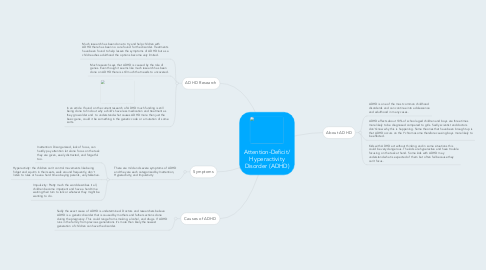Attention-Deficit/ Hyperactivity Disorder (ADHD)
by Kaitlyn Ramirez

1. Symptoms
1.1. There are mild and severe symptoms of ADHD and they are each categorized by Inattention, Hyperactivity, and Impulstivity
1.1.1. Inattention: Disorganized, lack of focus, can hardly pay attention let alone focus on the task they are given, easily distracted, and forgetful too.
1.1.2. Hyperactivity: the children can't control movements like being fidget and squirm in their seats, walk around frequently, don't listen to rules or have a hard time obeying parents, very talkative.
1.1.3. Impulsivity: Pretty much the word describes it all, children become impatient and have a hard time waiting their turn to talk or whatever they might be wanting to do.
2. Causes of ADHD
2.1. Sadly the exact cause of ADHD is undetermined. Doctors and researchers believe ADHD is a genetic disorder that is caused by mothers and fathers actions done during the pregnancy. This could range from smoking, alcohol, and drugs. If ADHD runs in the family from previous generations it's more than likely the newest generation of children can have the disorder.
3. ADHD Research
3.1. Much research has been done to try and help children with ADHD there has been no cure found for the disorder. Treatments have been found to help lessen the symptoms of ADHD but as a child reaches adulthood the options become very limited.
3.2. Much research says that ADHD is caused by the role of genes. Even though it seems like much research has been done on ADHD there is still much that needs to uncovered.
3.3. In an article I found on the current research of ADHD much funding is still being done to find out why a child's have less medication and treatment as they grow older and to understand what causes ADHD more then just the basic gene, could it be something in the genetic code or a mutation of some sorts.
4. About ADHD
4.1. ADHD is one of the most common childhood disorderds and can continue into adolescence and adulthood in many cases.
4.2. ADHD effects about 10% of school aged children and boys are three times more likely to be diagnosed compared to girls. Sadly scientist and doctors don't know why this is happening. Some theories that have been brought up is that ADHD occurs on the Y chromosome therefore causing boys more likely to be effected.
4.3. Kids with ADHD act without thinking and in some situations this could be very dangerous. The kids are hyperactive and have trouble focusing on the task at hand. Some kids with ADHD may understand what is expected of them but often fail because they can't focus.


